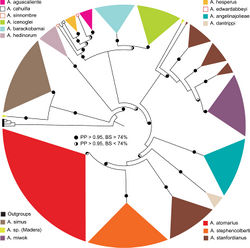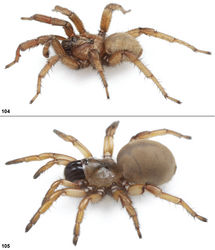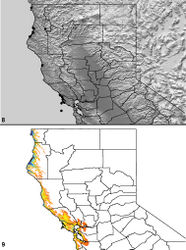Aptostichus miwok
| Notice: | This page is derived from the original publication listed below, whose author(s) should always be credited. Further contributors may edit and improve the content of this page and, consequently, need to be credited as well (see page history). Any assessment of factual correctness requires a careful review of the original article as well as of subsequent contributions.
If you are uncertain whether your planned contribution is correct or not, we suggest that you use the associated discussion page instead of editing the page directly. This page should be cited as follows (rationale):
Citation formats to copy and paste
BibTeX: @article{Bond2012ZooKeys252, RIS/ Endnote: TY - JOUR Wikipedia/ Citizendium: <ref name="Bond2012ZooKeys252">{{Citation See also the citation download page at the journal. |
Ordo: Araneae
Familia: Euctenizidae
Genus: Aptostichus
Name
Aptostichus miwok Bond, 2008 – Wikispecies link – Miwok Trapdoor Spider’ ZooBank link – Pensoft Profile
Diagnosis
Based on morphological features alone (Figs 98–103) this species can be difficult to diagnose from geographically proximate sibling species, Aptostichus stanfordianus, Aptostichus angelinajolieae, and Aptostichus stephencolberti but can be distinguished on the basis of a set of unique mtDNA nucleotide substitutions (see Bond and Stockman 2008[1]). The species is restricted in distribution to the coastal dune habitats of Marin, Sonoma, Mendocino, Humboldt, and Del Norte Counties (California). Individuals of Aptostichus stanfordianus, found only in inland habitats,are much darker in coloration whereas Aptostichus miwok specimens are much lighter (Figs 104, 105).
Description
Described by Bond (2008).
Material examined
United States: California: Del Norte Co.: Smith River St Park, Beach 1km W Kellogg Rd from Lower Lake Rd, 41.8695, -124.20731, 0m, J Bond, M Hedin 14.i.02 [MY290-93, 95, 3♀ 2juv, AUMNH]; Humboldt Co.: ~3.2km W Arcata, Lanphere-Christensen Dune Preserve, 40.8823, -124.14783, 3m, E Schlinger 26.vii.75 [AP522, 1♀, CAS]; Clam Beach Co Park, just S Crannell Rd exit on Clam Beach Dr, near Little River, 41.0133, -124.10921, 3m, J Bond, M Hedin 13.i.02 [MY300-04, 5♀, AUMNH]; S Spit Humboldt Bay, 40.6979, -124.27251, 0m, M Hedin, M Lowder 22.vi.00 [MY702-04, 3♀, AUMNH]; S Spit Humboldt Bay, S Eureka, 40.6992, -124.27381, 3m, M Hedin, R Keith, S Thomas, J Starrett 14.iii.06 [MY3542-46, 4♀, 1juv, AUMNH]; Trinidad, 41.0571, -124.14195, 8m, B Malkin 29.v.69 [AP266, 1♀, AMNH]; Hwy 96, N of Willow Creek, 41.0096, -123.64551, 210m, J Bond, A Stockman, D Beamer 15.iii.05 [MY3052, 1juv, AUMNH]; Marin Co.: Dillon St Beach, 38.2494, -122.96751, 3m, J Bond 14.v.97 [AP763, 764, 793, 805, 4juv, AUMNH]; N Beach, P Reyes Natl Seashore, 38.0011, -122.99735, 30m, E Rogers, 13.v.72 [AP465, 1♀, SCW]; E Schlinger 14.vi.75 [AP469, 1♀, CAS]; C Griswold 31.iii.75 [AP476, 1♀, CAS]; [AP479, 1♀, AMNH]; C Griswold 16.viii.81 [AP499, 1♀, CAS]; H Ewing 14.v.71 [AP1276, 1juv, CAS]; Pt Reyes Natl Seashore, 38.0262, -122.88313, 3m, J Cate 12.v.73 [AP1274, 1juv, CAS]; Dillon Beach, 38.2499, -122.96762, 1♂, A Stockman, P Marek 30.i.06 [MY3528, 1juv, AUMNH]; Pt Reyes Natl Seashore Kehoe Beach, 38.1553, -122.94831, 9m, A Stockman, P Marek 30.i.06 [MY3524-27, 1♀ 1♂ 3juv, AUMNH]; Pt Reyes Natl Seashore, Limantour Beach, 38.0262, -122.88311, 3m, A Stockman, P Marek 30.i.06 [MY3521-23, 2♀, 1 juv, AUMNH]; Mendocino Co.: 6.4km N Ft Bragg, Inglenook Fen area, 39.5304, -123.77123, 12m, L Keram 11.iv.73 [AP520, 1♀, CAS]; E Schlinger 17.vi.73 [AP521, 1♀, CAS]; Hwy 1, just S Ten Mile River crossing, N Ingelnook, dunefield W hwy, 39.5476, -123.76311, 5m, M Hedin, J Starrett 13.iii.06 [MY3538-41, 3♀ 1juv, AUMNH]; Inglenook Dunes, 39.5304, -123.77123, 10m, R Jackson 1.xi.74 [AP1269, 1♂, CAS], 19.iv.75 [AP1270, 1♂, CAS]; E Schlinger 30.iv.73 [AP1271, 1juv, CAS], 22.vii.72 [AP1272, 3juv, CAS]; N Inglenook Sand Dunes, 39.5422, -123.76181, 37m, J Bond, A Stockman, D Beamer 14.iii.05 [MY3049, 1juv, AUMNH]; San Francisco Co.: Petrel Bluff, 37.6978, -123.00177, 3m, M Ramirez 31.viii.86 [AP498, 5♀, 2juv, CAS]; SE Farallon Island, 37.6978, -123.00244, 7m, M Ramirez 1.ix.86 [AP438, 5♂, CAS], 2.ix.86 [AP475, 482, 149, 1♂ 2♀, CAS; AP491, 1juv, AMNH], 2.ix.88 [AP492, 2♀, AMNH], 1.ix.88 [AP007, 1♀, CAS], 30.viii.88 [AP189, 8♀, AMNH]; P Anderson 20.xii.56 [AP481, 1♀, 2juv, AMNH]; W Azevedo 12.iv.70 [AP494, 3♀, AMNH]; D Spadoni 10.iii.69 [AP505, 1♀ 1♂ 1juv, CAS]; D Hanna 6.v.49 [AP483, 2juv, AMNH]; H Leech 18.xi.49 [AP484, 6juv, AMNH]; W Hazeltine 23.x.51 [AP486, 2juv, AMNH]; H Keifer 15.x.26 [AP487, 1juv, AMNH]; E Bixford 17.iv.29 [AP502, 1♀, AMNH]; Sonoma Co.: Bodega Bay Dunes, 38.3137, -123.03913, 1m, R Robertson 16.ix.92 [AP493, 1♂, CAS]; Sonoma Coast St Beach, Bodega Dunes, 38.3389, -123.061491, 47m, A Stockman, P Marek 30.i.06 [MY3529-32, 4juv, AUMNH].
Variation, males (4). Cl 4.50-5.94, 5.35±0.30; Cw 4.25-5.00, 4.65±0.18; STRl 2.48-3.04, 2.78±0.13; STRw 2.33-2.73, 2.52±0.08; LBw 0.85-0.87, 0.86±0.01; LBl 0.43-0.60, 0.50±0.04; leg I: 4.10-5.30, 4.76±0.26; 2.48-3.50, 3.10±0.23; 2.36-3.30, 3.00±0.22; 1.52-2.00, 1.81±0.11; 1.55-2.05, 1.87±0.11; leg IV: 3.80-5.05, 4.44±0.26; 2.00-2.50, 2.25±0.1; PTl 1.85-2.38, 2.21±0.13; PTw 0.71-0.85, 0.79±0.03; Bl 0.85-1.17, 1.04±0.07; TSp 4-6, 4.75±0.48; TSr 1-3, 2.25±0.48; TSrd 4-5, 4.75±0.25.
Variation, females (5). Cl 6.06-7.00, 6.51±0.19; Cw 5.69-6.40, 6.01±0.14; STRl 3.32-4.00, 3.69±0.12; STRw 3.29-3.75, 3.50±0.10; LBw 1.11-1.36, 1.24±0.05; LBl 0.68-0.94, 0.81±0.05; Leg I: 13.00-16.15, 14.30±0.59; ANTd 5-8, 6.80±0.49; PTLs 16-25, 21.80±1.59; TBs 3-6, 5.20±0.58.
GenBank accessions
16S-tRNAval-12S: EU569901-EU569910, EU569919-EU569921, EU569922, EU569927-EU569929, EU570022, EU570035, JX103340-JX103353; 18S (partial)-ITS1-5.8S-ITS2: EU569893, EU569894.
Distribution and natural history
Aptostichus miwok is distributed throughout the geographically disjunct coastal dune habitats of Del Norte, Humboldt, Mendocino, Sonoma, Marin, and San Francisco counties of central and northern California (Map 8). A single inland specimen (Humboldt) is placed with this species on the basis of the molecular data. The DM for Aptostichus miwok (Map 9) corresponds closely to the known occurrences with the largest areas of high probability of occurrence in the more northern extent of the species’ distribution. The model indicates that inland localities may be suitable despite the paucity of known inland populations. The habitat requirements and general burrow structure is very similar to that described for Aptostichus stephencolberti. All populations are located in the coastal dune habitat. Males have been collected in the months of September, November, January, March, and April.
Conservation status
Aptostichus miwok is abundant and widespread across its distribution and thus is likely classified as secure.
Species concept applied
Cohesion. Aptostichus miwok is considered to be ecological non-interchangeable from other closely related lineages–it is restricted to coastal dune habitat and has psammophilic features (e.g., lighter coloration).
Remarks
The recognition of Aptostichus miwok by Bond and Stockman (2008)[1] as a species renders one of the Aptostichus stanfordianus lineages paraphyletic (Fig. 28). While this is somewhat problematic, I have chosen to uphold this decision because of the adaptive diversity contained within the nominal Aptostichus miwok lineage and apparent lack of both genetic and ecological interchangeability between this lineage and Aptostichus stanfordianus.
Taxon Treatment
- Bond, J; 2012: Phylogenetic treatment and taxonomic revision of the trapdoor spider genus Aptostichus Simon (Araneae, Mygalomorphae, Euctenizidae) ZooKeys, 252: 1-209. doi
Other References
- ↑ 1.0 1.1 Bond J, Stockman A (2008) An Integrative Method for Delimiting Cohesion Species: Finding the Population-Species Interface in a Group of Californian Trapdoor Spiders with Extreme Genetic Divergence and Geographic Structuring. Systematic Biology 57: 628-646. doi: 10.1080/10635150802302443
Images
|

![Figures 98–103. Aptostichus miwok Bond, 2008. 98 male habitus from Mendocino Co., Inglenook Dunes (AP1270) [805812] 99–101 male paratype (AP149) from San Francisco Co., Farallon Islands; scale bars = 1.0mm 99 retrolateral aspect, leg I [805801] 100 prolateral aspect, leg I [805797] 101 retrolateral aspect, pedipalp [805803] 102 female habitus from Mendocino Co., Inglenook Dunes (AP520) [805808] 103 spermathecae, female holotype (MY301) [805804]; scale bar = 0.10mm.](https://species-id.net/o/thumb.php?f=ZooKeys-252-001-g025.jpg&width=208)

